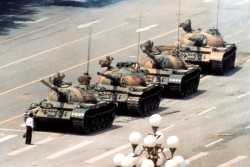 In the essential film The Story of Stuff, Annie Leonard says, “Our primary identity has become that of consumer.” This is certainly a disturbing notion for those of us who are trying to steer our society toward sustainability. Perhaps even more disturbing, though, is the way that environmentalists endorse and ultimately perpetuate this mutation of our humanity.
In the essential film The Story of Stuff, Annie Leonard says, “Our primary identity has become that of consumer.” This is certainly a disturbing notion for those of us who are trying to steer our society toward sustainability. Perhaps even more disturbing, though, is the way that environmentalists endorse and ultimately perpetuate this mutation of our humanity.
The vast majority of times green groups ask people to act, it centers on changing our consumption habits. At first glance this makes sense. If consumption is the problem, shouldn’t we try to change the way people consume? The catch is that every time we focus on how individuals can change their consumption, we are sending the message that their real power to make a difference lies in how they shop. This simply reinforces the cultural myth that the most important part of who we are as people is our role as a consumer.
That myth is a lie. We are much more than consumers. We are citizens of what was once the greatest democracy on the planet, citizens with the ability and responsibility to change our government. We are human beings with the power to inspire others through our creativity, our sacrifice, and our courage. These are the parts of humanity we must point to when we call others to action.
The focus on individual consumption habits comes from the notion that changes on any level start with personal transformation. That is certainly true, but not all personal transformations are created equal. Changing people from being obsessed with consumption to being obsessed with green consumption is not going to get us to real sustainability. We need transformations away from consumer-centered identity into human-centered identity. We need personal evolution into engaged and demanding citizens and into bold and creative activists. We need the kind of transformations that awaken us to our own potential and remind us that we are not helpless.
Of course, those consumption habits do need to change if we’re going to have a livable future. But to get that sustainable culture, who we are as consumers will have to become a small part of who we are as human beings. When we start people on that road of personal transformation, we automatically attack that pathological overconsumption. The spiritual void which begs for material consumption begins to be filled by a more human identity. In order to truly be the change we want to see in the world, we environmental leaders might have to stop talking to people about their consumption so much.
When I ask people to take action against climate change, they often think what I’m asking them to do is impossible. If someone only sees herself as a consumer, it makes sense that she cannot see her potential to be an agent of fundamental change in our society, economy or political system. I suspect this is responsible for much of the helplessness many people feel when addressing huge issues like climate change. Our job in Peaceful Uprising is to show people that they are not helpless.
Leave a Reply